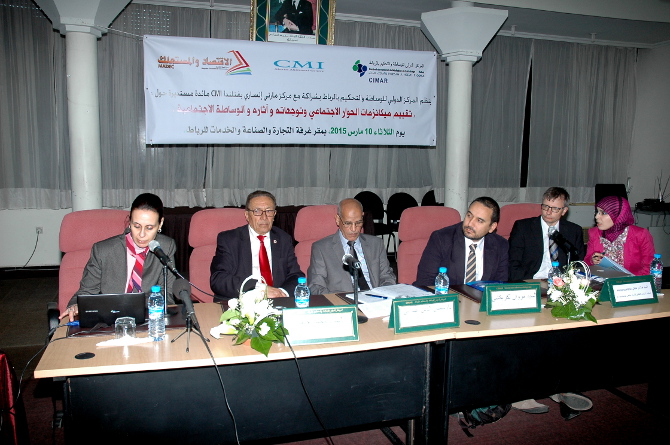Stocktaking on social dialogue processes in Morocco: challenges & prospects?
On 10 March 2015, CMI, in conjunction with Centre International de Mediation et Arbitrage de Rabat (CIMAR), held a one day workshop, under the theme “Stocktaking on social dialogue processes for consensual policy recommendations in the Moroccan context”.
The aim of the workshop was to set up a platform for dialogue on estimating main characteristics of the social dialogue structure and its role as a conflict prevention mechanism in Morocco.
This meeting’s timing is prescient as labor unions have been demanding that the government set up an advisory council to track the dialogue between the government and the trade unions. The CMI sponsored assessment on trends in the social dialogue processes informed the framework of discussion.
Through a focus on tracing the multi-stakeholder strategies of social dialogue, the roundtable sessions debated governmental strategies on social dialogue for conflict resolution, the linkage between social dialogue and mediation techniques and the Nordic good practices in the area of social dialogue and implications for public policy making processes. The themes were highlighted by Professor Heikki Hiilamo of University of Helsinki.
Several recommendations ensued
Overall, the workshop allowed for an open discussion with participants on social dialogue processes and their linkage to contentious socio-economic issues, and stocktaking and assessment of social dialogue processes from a multi-disciplinary perspective.
The program was met with strong interest. Participants included members from labor unions, political parties, civil society organizations, the private sector, academia and policy makers.
Upon the conclusion of the workshop, several recommendations ensued from the discussions. They included, but were not limited to:
- improving the institutional set-up of social dialogue to circumspect the gap in de facto implementation of social dialogue mechanisms caused by the change of governments;
- separation of social dialogue processes from party politics given the entanglement of political interests with labor unions in Morocco;
- and capacity building in advocacy and mediation to socio-economic stakeholders such as civil society and burgeoning labor unions to instill trust in the social dialogue process, dominated thus far by a handful of players in Morocco.
